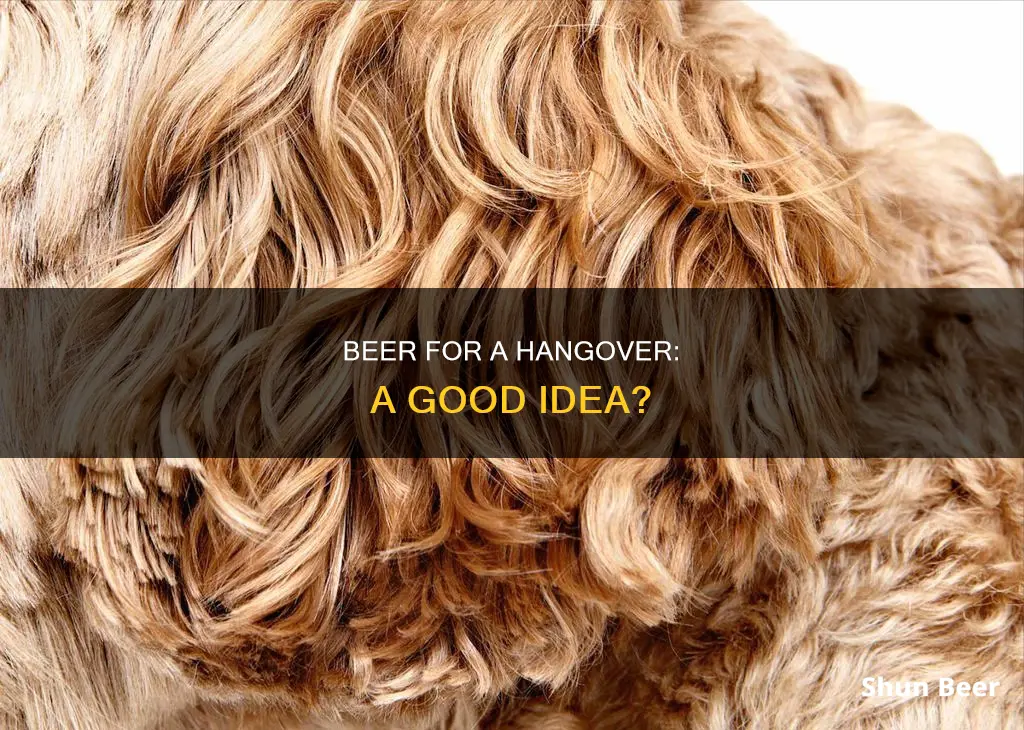
Drinking alcohol is often associated with a fun time, but the morning after can be a different story. The dreaded hangover can include a range of unpleasant symptoms, such as fatigue, headache, nausea, and dehydration. Many people swear by the hair of the dog method, which involves drinking more alcohol to alleviate these symptoms. But does it actually work?
| Characteristics | Values |
|---|---|
| Effectiveness of drinking beer for a hangover | Temporary relief, but may worsen the hangover when stopped drinking |
| Other names for this method | "Hair of the dog", "hair of the dog that bit you" |
| How it works | Raises blood alcohol level, boosts endorphins, slows the production of hangover-inducing compounds |
| Prevalence | Relatively common, with 11% of social drinkers reporting using this method |
| Scientific evidence | Not well-studied, but theories suggest it may help by raising blood alcohol levels and boosting endorphins |
| Risks | May lead to an even worse hangover, associated with a higher risk of alcohol abuse and unhealthy drinking patterns |
| Recommended alternatives | Drinking in moderation, eating food, staying hydrated, sleeping well, taking an NSAID pain reliever |
What You'll Learn
- Drinking more alcohol may provide temporary relief but will worsen your hangover
- The only cure for a hangover is time
- Drinking water and eating food while drinking can help prevent a hangover
- Hair of the dog is a myth
- Hangovers can be dangerous, impairing attention, decision-making, and muscle coordination

Drinking more alcohol may provide temporary relief but will worsen your hangover
Drinking alcohol to cure a hangover is a common practice, with 11% of social drinkers reporting that they have consumed alcohol to get rid of a hangover at least once in the last year. This method is known as "hair of the dog" and involves drinking more alcohol to reduce hangover symptoms. While it may provide temporary relief, it will ultimately worsen your hangover.
The theory behind "hair of the dog" is that raising your blood alcohol level will alleviate hangover symptoms. A hangover typically develops as your body breaks down alcohol, with symptoms worsening when blood alcohol levels return to zero. Therefore, drinking more alcohol can temporarily alleviate these symptoms by raising your blood alcohol level again. However, once you stop drinking, your blood alcohol level will eventually return to zero, and the hangover will come back. So, while "hair of the dog" may delay the hangover, it cannot prevent it entirely.
Additionally, drinking more alcohol can boost endorphin levels, which can help mask the uncomfortable symptoms of a hangover. However, when you stop drinking, endorphin levels will drop, and the hangover symptoms will return. This endorphin surge and crash also play a role in the addictive properties of alcohol.
Another theory supporting the "hair of the dog" method is that it slows the production of hangover-inducing compounds. Alcoholic beverages often contain small amounts of congeners, which are formed during the fermentation process. These congeners are believed to contribute to the severity of a hangover. By drinking more alcohol, you can slow down the creation of these toxic compounds, thereby delaying the onset of the hangover. However, this method still adds more alcohol to your system that will eventually need to be metabolized.
While "hair of the dog" may provide temporary relief, it is important to remember that it will not prevent the hangover entirely. Instead, it will come back once you stop drinking, and it may even be worse than before. Additionally, regularly using this method can increase your tolerance to alcohol, leading to a higher risk of alcohol dependence. Therefore, it is not recommended as a hangover cure.
The only guaranteed way to avoid a hangover is to abstain from drinking or to drink in moderation. If you do choose to drink, it is important to pace yourself, drink plenty of water, and ensure you are well-rested and nourished.
Conquering Fears: A Beer-Filled Adventure
You may want to see also

The only cure for a hangover is time
Drinking a beer to cure a hangover, also known as "hair of the dog", is a myth. While it may provide temporary relief by boosting endorphins and slowing the creation of toxic compounds, it will not prevent a hangover entirely. In fact, drinking more alcohol may worsen your hangover and increase your risk of alcohol abuse. The only cure for a hangover is time, as your body needs to finish clearing the toxic byproducts of alcohol metabolism, rehydrate, heal irritated tissue, and restore immune and brain activity to normal.
A hangover refers to a set of symptoms that occur as a consequence of drinking too much. Typical symptoms include fatigue, weakness, thirst, headache, muscle aches, nausea, stomach pain, vertigo, sensitivity to light and sound, anxiety, irritability, sweating, and increased blood pressure. These symptoms can last 24 hours or longer.
There are some things you can do to alleviate hangover symptoms. Drinking plenty of water can help with dehydration, which can make hangover symptoms worse. Eating something can help boost your energy levels and settle your stomach. Taking an over-the-counter pain reliever, such as acetaminophen or ibuprofen, can help with headaches and other pain-related symptoms. However, it is important to proceed with caution when using these medications in combination with alcohol, as they can be toxic to the liver and irritate the lining of the stomach.
The best way to avoid a hangover is to not drink alcohol at all or to keep your alcohol intake to a minimum. Sticking to low-risk drinking guidelines, such as no more than 14 units of alcohol per week, can help reduce the risk of a hangover and lower your risk of alcohol-related health problems.
Beer and Fun: Chuck E. Cheese, Atlanta Style!
You may want to see also

Drinking water and eating food while drinking can help prevent a hangover
Drinking water and eating food while drinking alcohol can help prevent a hangover. Alcohol is a diuretic, meaning that it increases the production of urine and leads to mild dehydration, which is a common cause of hangovers. Drinking water while consuming alcohol can help prevent dehydration and reduce the risk of a hangover. Eating food while drinking can also help slow the absorption of alcohol into the bloodstream, leading to reduced intoxication and a lower risk of a hangover.
Drinking water and eating food before bed and the next morning can also help alleviate hangover symptoms. Dehydration can worsen hangover symptoms, so drinking water can help reduce the negative effects of a hangover. Eating food can help boost energy levels and settle the stomach, which is often irritated by alcohol consumption. Consuming foods that contain vitamins and minerals can help replenish depleted resources and aid in the recovery process.
While drinking water and eating food can help prevent and alleviate hangovers, the only guaranteed way to avoid a hangover is to abstain from drinking alcohol or to drink in moderation. Hangovers are caused by drinking too much alcohol, and the more alcohol consumed, the more likely and severe the hangover will be. Drinking water and eating food while drinking alcohol can assist in moderating alcohol consumption and reducing the risk of a hangover.
It is important to note that while some people may believe in the "hair of the dog" method, which involves drinking more alcohol to cure a hangover, this is not an effective remedy. Drinking more alcohol may provide temporary relief by raising blood alcohol levels and boosting endorphins, but it will not prevent the hangover entirely. Instead, it will prolong the time until the hangover is experienced and may even worsen it. Therefore, it is not recommended as a cure for hangovers.
Andre the Giant's Unbelievable Beer Drinking Capacity
You may want to see also

Hair of the dog is a myth
"Hair of the dog" is a colloquial term for the practice of drinking alcohol to relieve a hangover. The phrase is a shortening of the expression "a hair of the dog that bit you". This comes from the idea that the cause of an ailment can also be its cure.
While this method may provide temporary relief, it is a myth that drinking more alcohol will cure a hangover. In fact, drinking more alcohol may worsen your hangover and prolong the time until you experience it. This is because drinking more alcohol will 'top up' your blood alcohol level, extending the amount of time you have alcohol in your system. Once your body is able to get rid of the alcohol from your system, you will still experience a hangover if you are prone to them.
Drinking more alcohol to relieve a hangover is also linked to higher rates of alcohol abuse and may normalise unhealthy drinking patterns. Routine "hair of the dog" drinking will increase your tolerance to alcohol, meaning you need to drink more to experience the same effect, and increasing your risk of becoming alcohol-dependent.
The only guaranteed way to avoid a hangover is to not drink or to drink in moderation.
Beer and Paxlovid: Safe Mix or Health Risk?
You may want to see also

Hangovers can be dangerous, impairing attention, decision-making, and muscle coordination
Drinking alcohol can have serious consequences on the body and mind, and these effects can linger even after the alcohol has left the bloodstream. Hangovers can be both painful and dangerous, impairing attention, decision-making, and muscle coordination.
A hangover refers to a set of symptoms that occur as a consequence of drinking too much alcohol. These symptoms include fatigue, weakness, thirst, headache, muscle aches, nausea, stomach pain, vertigo, sensitivity to light and sound, anxiety, irritability, sweating, and increased blood pressure. The severity of these symptoms depends on how much an individual drank and for how long, but also on their health and other factors. Some people get a hangover after just one drink, while some heavy drinkers don't experience any symptoms at all.
During a hangover, a person's attention, decision-making, and muscle coordination can all be significantly impaired. This can negatively affect their ability to perform important tasks, such as driving, operating machinery, or caring for others. Research has shown that people who are hungover have poorer attention, memory, and coordination skills compared to those who are not. This means that driving a car while hungover can impair one's ability to react efficiently to a red light, for example.
The dangers of hangovers are often underestimated, and it is important to recognize that they can have serious consequences. The only surefire way to avoid a hangover is to abstain from drinking alcohol or to drink in moderation. While there are many purported remedies for hangovers, there is no scientific evidence that they are effective. The only true cure for a hangover is time, as the body needs to clear the toxic byproducts of alcohol metabolism, rehydrate, heal irritated tissue, and restore immune and brain activity to normal.
Mixing Beer and Adderall: What You Need to Know
You may want to see also
Frequently asked questions
No, drinking more alcohol will only 'top up' your blood alcohol level, extending the amount of time you have alcohol in your system. You'll still get a bad hangover once your body is able to get rid of the alcohol.
A hangover can include fatigue, weakness, thirst, headache, muscle aches, nausea, stomach pain, vertigo, sensitivity to light and sound, anxiety, irritability, sweating, and increased blood pressure.
A number of factors can contribute to hangovers, including mild dehydration, disrupted sleep, gastrointestinal irritation, inflammation, and acetaldehyde exposure.
The only thing that will get rid of your hangover is time, but there are some things you can do to alleviate the symptoms, such as drinking plenty of water, eating something sugary, and taking an antacid.







